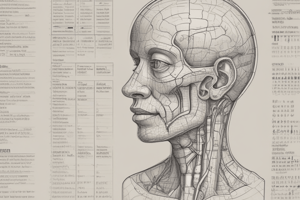Podcast
Questions and Answers
What is the primary goal of neurological health assessment?
What is the primary goal of neurological health assessment?
To evaluate the function and integrity of the nervous system.
Which component of neurological health assessment involves observation of the patient's appearance and behavior?
Which component of neurological health assessment involves observation of the patient's appearance and behavior?
Inspection.
What is the purpose of the mental status examination in neurological health assessment?
What is the purpose of the mental status examination in neurological health assessment?
To assess cognitive function, including level of consciousness, orientation, and memory.
Which diagnostic test measures electrical activity in the brain?
Which diagnostic test measures electrical activity in the brain?
What is the importance of early detection and diagnosis of neurological disorders?
What is the importance of early detection and diagnosis of neurological disorders?
Which component of neurological health assessment involves examination of the 12 cranial nerves?
Which component of neurological health assessment involves examination of the 12 cranial nerves?
What is the purpose of laboratory tests in neurological health assessment?
What is the purpose of laboratory tests in neurological health assessment?
What is the role of the physical examination in neurological health assessment?
What is the role of the physical examination in neurological health assessment?
Flashcards are hidden until you start studying
Study Notes
Introduction
- Neurological health assessment is a crucial component of healthcare that evaluates the function and integrity of the nervous system.
- It involves a combination of physical examination, patient history, and diagnostic tests to identify neurological disorders or diseases.
Components of Neurological Health Assessment
- Medical History:
- Patient's chief complaint and history of present illness
- Past medical history, including pre-existing conditions and medications
- Family medical history and social history
- Physical Examination:
- Inspection: observation of patient's appearance and behavior
- Palpation: examination of the patient's body through touch
- Percussion: examination of organs through tapping
- Auscultation: listening to internal sounds with a stethoscope
- Neurological Examination:
- Mental status examination: assessment of cognitive function, including level of consciousness, orientation, and memory
- Cranial nerve examination: assessment of the 12 cranial nerves
- Motor examination: assessment of muscle strength, tone, and coordination
- Sensory examination: assessment of sensation, including pain, temperature, and touch
- Reflex examination: assessment of deep tendon reflexes
Diagnostic Tests
- Imaging Studies:
- Computed Tomography (CT) scan
- Magnetic Resonance Imaging (MRI)
- Positron Emission Tomography (PET) scan
- Electrodiagnostic Tests:
- Electroencephalogram (EEG): measures electrical activity in the brain
- Electromyogram (EMG): measures electrical activity in muscles
- Nerve Conduction Studies (NCS): measures electrical activity in nerves
- Laboratory Tests:
- Complete Blood Count (CBC)
- Blood Chemistry Tests (e.g., glucose, electrolytes)
- Cerebrospinal Fluid (CSF) analysis
Importance of Neurological Health Assessment
- Early detection and diagnosis of neurological disorders can improve patient outcomes
- Accurate assessment guides treatment decisions and monitors treatment response
- Comprehensive assessment helps identify underlying causes of neurological symptoms
Neurological Health Assessment
- Evaluates the function and integrity of the nervous system through a combination of physical examination, patient history, and diagnostic tests.
Components of Neurological Health Assessment
- Medical History involves:
- Chief complaint and history of present illness
- Past medical history, including pre-existing conditions and medications
- Family medical history and social history
- Physical Examination involves:
- Inspection: observation of patient's appearance and behavior
- Palpation: examination of the patient's body through touch
- Percussion: examination of organs through tapping
- Auscultation: listening to internal sounds with a stethoscope
- Neurological Examination involves:
- Mental status examination: assessment of cognitive function, including level of consciousness, orientation, and memory
- Cranial nerve examination: assessment of the 12 cranial nerves
- Motor examination: assessment of muscle strength, tone, and coordination
- Sensory examination: assessment of sensation, including pain, temperature, and touch
- Reflex examination: assessment of deep tendon reflexes
Diagnostic Tests
- Imaging Studies:
- Computed Tomography (CT) scan
- Magnetic Resonance Imaging (MRI)
- Positron Emission Tomography (PET) scan
- Electrodiagnostic Tests:
- Electroencephalogram (EEG): measures electrical activity in the brain
- Electromyogram (EMG): measures electrical activity in muscles
- Nerve Conduction Studies (NCS): measures electrical activity in nerves
- Laboratory Tests:
- Complete Blood Count (CBC)
- Blood Chemistry Tests (e.g., glucose, electrolytes)
- Cerebrospinal Fluid (CSF) analysis
Importance of Neurological Health Assessment
- Early detection and diagnosis of neurological disorders can improve patient outcomes
- Accurate assessment guides treatment decisions and monitors treatment response
- Comprehensive assessment helps identify underlying causes of neurological symptoms
Studying That Suits You
Use AI to generate personalized quizzes and flashcards to suit your learning preferences.




